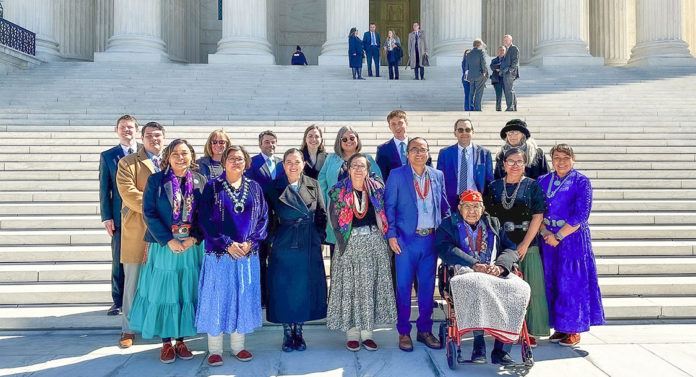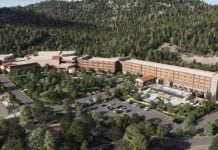
WASHINGTON, D.C. – Leaders of the Navajo Nation were in Washington, D.C. this week to attend a U.S. Supreme Court hearing in which attorneys presented oral arguments in the consolidated cases of the Department of the Interior v. Navajo Nation and State of Arizona v. Navajo Nation, which will have longstanding implications for the Navajo Nation’s claims to water in the State of Arizona.
Navajo Nation President Buu Nygren, Vice President Richelle Montoya, Speaker Crystalyne Curley, Council Delegates Eugenia Charles-Newton and Brenda Jesus, and Navajo Nation Attorney General Ethel Branch attended the hearing to offer their support for the Navajo Nation’s arguments in the case. They were also joined by former Navajo Tribal Chairman Peter MacDonald and Navajo Nation Water Rights Commission Chair Joelynn Ashley.
The two issues before the Supreme Court are whether the United States has a treaty-based duty to assess the Navajo Nation’s water needs and develop a plan to meet them, and whether a lower federal court order requiring the United States to assess the Nation’s water needs and develop a plan to meet them would conflict with the Court’s decree in Arizona v. California, a ruling that limited the circumstances in which the federal government could divert water from the Lower Colorado River.
Part of the Navajo Nation’s argument contends that the United States promised to assist the Navajo people in meeting their water needs when it entered into two treaties with Navajo leaders. In 1849, the federal government promised to take the Navajo people under its protection and establish a reservation for their exclusive use. In 1868, the federal government began to fulfill that second promise by setting aside a small part of the Nation’s aboriginal territory as the Navajo peoples’ permanent home. Through these treaties, the United States undertook a duty of trust to the Navajo Nation.
“This case goes beyond the fiduciary duty of the federal government,” said Speaker Curley. “The outcome of this hearing may determine the livelihood of our Navajo people now, and for all future generations. The right to water centers on our right to a permanent homeland through our treaties and the prayers of our ancestors since time immemorial. As a child, I grew up in a home without running water and to this day, we still have over 30 percent of our people who don’t have access to clean running water in their homes. Our leaders long ago fought for our right to our homeland and that includes the right to water – the right to life.”
According to a March 19 statement issued by the Navajo Nation Department of Justice, the Supreme Court recognized in the 1908 case of Winters v. United States that a permanent home for tribal nations requires water. However, the United States has failed to live up to its obligation to make the lands of the Navajo people, located in Arizona adjacent to the Colorado River, productive and allow the Navajo people to thrive as their non-Native neighbors in Arizona have done. After repeated requests that the United States specifically address the unmet needs, in 2003, the Nation sued the federal government for breach of trust. The states of Arizona, Nevada and Colorado intervened together with two California irrigation districts over concerns that the Nation’s suit would impair their water rights.
The Navajo Nation seeks a favorable ruling from the Supreme Court confirming that the Navajo Nation has a viable claim against the federal government and to permit the Navajo Nation to return to the District Court to present its claim that the United States has an enforceable duty to fulfill its treaty promises that the Navajo Nation will have access to the water it needs to support a flourishing permanent homeland.
President Nygren said the case offers the United States an opportunity to live up to its trust responsibility. “We honored our end of the deal, and they just need to honor their end of the deal,” said Nygren.
Closing arguments are expected to be presented in April and the U.S. Supreme Court is expected to issue its ruling in the case in June.













































